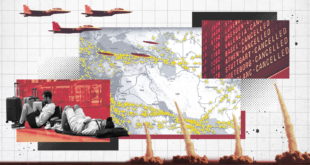 UN Secretary General Ban Ki-moon on Monday night outlined his plan for the establishment of a chemical weapons mission with about 100 experts to destroy Syria’s chemical arsenal.
UN Secretary General Ban Ki-moon on Monday night outlined his plan for the establishment of a chemical weapons mission with about 100 experts to destroy Syria’s chemical arsenal.
The plan would mark the first time that the UN has carried out such a task in the midst of a civil war.
The team, to be made up of UN political and security officers, as well as technical experts from the Organization for the Prohibition of Chemical Weapons (OPCW), will set up its staging area in Cyprus, maintaining only “a light footprint” in Syria, Ban said in a 10-page letter to the UN Security Council. Its mission will be to destroy the Syrian chemical program – including more than 1,000 metric tons of chemical weapons, agents and precursors – by June 30.
The UN plan, which will require approval by the Security Council, is designed to implement an agreement on Syria’s chemical weapons that was brokered by the United States and Russia and endorsed by the council and the OPCW’s executive board.
The UN has sent an advance team of 35 inspectors to Damascus to begin dismantling Syria’s chemical weapons program; the team is using “cutting torches and angle grinders to destroy or disable” some “missile warheads, aerial bombs and mixing and filling equipment,” Ban said.
But the operation will need to scale up rapidly in the coming weeks to handle the task. And Ban wrote that he would appoint a “special coordinator,” to manage the mission’s operations, after consultations with the director general of the OPCW, adding that the UN and the OPCW would move “as soon as possible” to conclude a status-of-forces agreement with Syria to govern the terms of their work in the country.
In his letter, Ban detailed the enormous security challenges that the UN has confronted in Syria. Just hours before the advance team arrived in Damascus, two mortars shells landed near their hotel. Conditions are “dangerous and volatile, particularly in urban areas such as Damascus, Homs and Aleppo,” Ban wrote. “Heavy artillery, air strikes, mortar barrages and the indiscriminate shelling of civilian areas are commonplace and battle lines shift quickly.” So far, Ban said, Syria has “fully cooperated” with the advance team. But, he added, “without sustained, genuine commitment by the Syrian authorities the joint mission will fail in its objectives.” Such cooperation would require the “provision for immediate and unfettered access to sites and personnel,” he said.
According to Ban’s plan, the inspections will be carried out in three phases, beginning with an assessment of Syria’s declarations of its chemical weapons program and a preliminary inspection of the country’s chemical weapons production facilities.
 Eurasia Press & News
Eurasia Press & News


